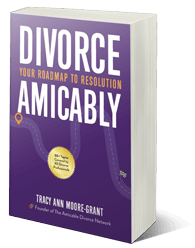Debunking Common Divorce Myths: A Smarter Approach to Divorce

Divorce is surrounded by misconceptions that can make an already difficult process even more overwhelming. In the latest episode of the Amicable Divorce Network Podcast, ADN founder Tracy Ann Moore-Grant sits down with family law attorney Jeanette Soltys of Atlanta Holistic Family Law, contributing author to our new book, to discuss her “Divorce Myths” which can be found in Chapter 4 of our new book, Divorce Amicably: Your Roadmap to Resolution (INSERT BOOK LINK), to tackle four common divorce myths. Their discussion sheds light on how these myths can lead people down expensive, unnecessary, and emotionally exhausting paths—and how the amicable divorce process offers a better alternative.
Myth #1: You Need the Most Aggressive Lawyer to “Win” Your Divorce
One of the most harmful misconceptions is that hiring an aggressive, “bulldog” attorney will get you the best outcome. Many people believe that a high-conflict lawyer will fight harder and secure them more money, custody rights, or a better deal. But in reality, this strategy often backfires.
Why the Aggressive Approach Fails
🔹 It’s expensive. Every aggressive move—filing unnecessary motions, sending inflammatory legal letters, dragging issues to court—drives up attorney fees. Jeanette shares an example where one party’s aggressive approach cost their client $7,000 in legal fees for a single motion that could have been resolved with a simple conversation.
🔹 It slows down the process. When lawyers take a fight-first approach, simple disputes that could be resolved in hours end up taking months to work through the court system. This creates stress, uncertainty, and wasted time for both parties.
🔹 Judges prefer reasonable parties. Judges see aggressive lawyers daily, and most of them aren’t impressed. They don’t reward unnecessary conflict—they want fair, reasonable resolutions that serve the best interests of both parties, especially when children are involved.
A Better Alternative
Instead of paying a lawyer to fuel conflict, the amicable divorce process encourages collaboration and problem-solving—getting faster, less expensive, and more satisfying results. By choosing attorneys who focus on resolution rather than aggression, couples can reach agreements efficiently, keep more of their money, and minimize emotional damage.
Myth #2: “My Spouse is a Narcissist—That Changes Everything”
“Narcissist” has become a buzzword in divorce conversations, but true narcissistic personality disorder (NPD) is rare—studies estimate that only 1-5% of the population qualifies for a clinical diagnosis. Yet, half of all divorce clients claim their spouse is a narcissist.
Why the Narcissism Label Doesn’t Matter in Divorce
📌 Courts focus on behavior, not labels. Judges don’t care if your spouse has NPD—they care about how their behavior impacts children, finances, and decision-making. If someone is manipulative, uncooperative, or emotionally abusive, the court will evaluate those behaviors, but an official “narcissist” diagnosis won’t automatically change the case outcome.
📌 Litigation gives difficult spouses more power. Many truly toxic individuals thrive on conflict. Traditional litigation allows them to weaponize the legal system—filing unnecessary motions, prolonging proceedings, and draining financial resources just to maintain control. The amicable divorce process removes this weapon by prioritizing structured, goal-oriented negotiations.
📌 The key is learning to manage difficult personalities. Rather than spending time and money trying to diagnose a toxic spouse, focus on strategies to minimize their ability to create conflict. Professionals in the amicable divorce process are trained in dealing with high-conflict individuals, ensuring that the divorce moves forward without unnecessary drama.
Myth #3: Fault (Like Adultery) Significantly Impacts Divorce Outcomes
Many people believe that if they can prove their spouse cheated, they will automatically get a larger share of assets, full custody, or a financial windfall. In reality, fault matters far less than most people think.
The Truth About Fault in Divorce
✔️ Judges rarely punish cheating spouses. Adultery is so common in divorce cases that most judges don’t even react to it unless it directly impacts finances or children.
✔️ Money lost to an affair can be recovered—but that’s it. If a spouse spent marital funds on an affair (hotels, gifts, trips), the court may award reimbursement. But this is typically a small amount compared to the total assets being divided.
✔️ Parenting decisions aren’t based on morality. Unless a spouse’s behavior directly harms the children (e.g., exposing them to inappropriate situations), custody decisions aren’t influenced by cheating, partying, or reckless behavior. Judges prioritize co-parenting ability over moral judgments.
Instead of fixating on past grievances, amicable divorce professionals help clients focus on practical, forward-thinking solutions—preserving financial security, creating a co-parenting plan, and securing a smooth transition for the entire family.
Myth #4: It Matters Who Files for Divorce First
Many people rush to the courthouse under the belief that filing first gives them a legal advantage. But in most cases, it makes no difference in the outcome.
When Does Filing First Matter?
🚨 Emergencies. If there are domestic violence concerns, financial abuse, or child safety risks, filing first can be necessary to secure protective orders or temporary custody arrangements.
📝 Guiding the divorce process. Filing first allows a spouse to propose using the amicable divorce process before the other party hires a high-conflict attorney. If you wait too long, your spouse may hire an aggressive lawyer, locking you into litigation that is difficult to escape.
In most situations, though, who files first does not affect financial settlements or custody decisions—what matters is how the case is handled once the process begins.
Myth #5: “If We Agree on Everything, We Can Just Download Forms Online”
While there are plenty of do-it-yourself divorce kits available online, relying solely on them can be risky—even in seemingly simple cases. Every couple’s situation has unique nuances that generic forms can’t fully address, especially when it comes to retirement accounts, real estate, debts, or parenting schedules.
Even if you’re pursuing an uncontested divorce, it’s still wise to have an attorney review the documents to make sure everything is enforceable, fair, and in compliance with Georgia law. Errors or omissions in DIY paperwork can cause delays, rejections by the court, or worse—leave you exposed to future legal issues.
An attorney can ensure your agreements are solid, protect you from oversights, and give you peace of mind that your fresh start is on firm ground.
How to Divorce Smarter: The Amicable Divorce Process
The myths surrounding divorce can lead people into unnecessary conflict, wasted time, and enormous legal fees. The Amicable Divorce Network offers a better way:
🔹 Work with resolution-focused professionals who prioritize fairness, efficiency, and respect.
🔹 Keep control over the process instead of leaving critical life decisions up to a random judge.
🔹 Save money and time by avoiding unnecessary court battles.
🔹 Protect children from conflict by fostering cooperation instead of hostility.
If you’re considering divorce, take the first step toward an amicable resolution. Reach out today to learn how the process can work for you.
📩 Contact us at info@amicabledivorcenetwork.com
🔎 Find an Amicable Divorce Professional: Visit our website
Recent Posts
From the Book: Divorce Amicably
Chapter 4: Myths About Divorce
Divorce is often portrayed as a harrowing experience, filled with emotional battles, financial devastation, and prolonged legal proceedings. While it’s true that divorce is rarely easy, much of the dread surrounding it stems from myths that create unnecessary fear and misunderstanding. In this chapter, we’ll explore the most pervasive myths about divorce – and reveal the truth behind them.








